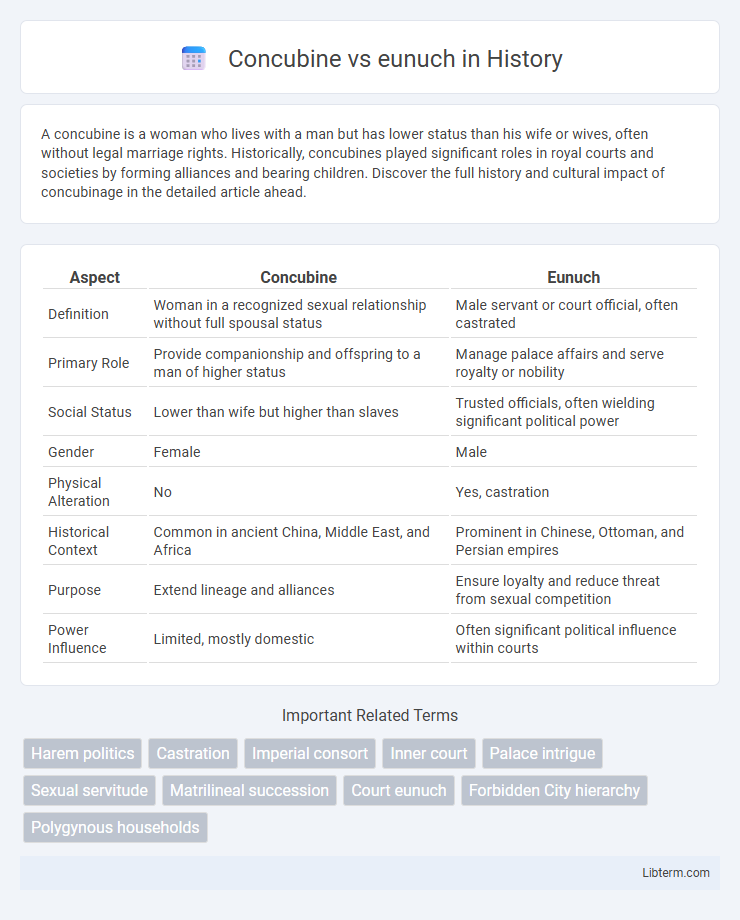A concubine is a woman who lives with a man but has lower status than his wife or wives, often without legal marriage rights. Historically, concubines played significant roles in royal courts and societies by forming alliances and bearing children. Discover the full history and cultural impact of concubinage in the detailed article ahead.
Table of Comparison
| Aspect | Concubine | Eunuch |
|---|---|---|
| Definition | Woman in a recognized sexual relationship without full spousal status | Male servant or court official, often castrated |
| Primary Role | Provide companionship and offspring to a man of higher status | Manage palace affairs and serve royalty or nobility |
| Social Status | Lower than wife but higher than slaves | Trusted officials, often wielding significant political power |
| Gender | Female | Male |
| Physical Alteration | No | Yes, castration |
| Historical Context | Common in ancient China, Middle East, and Africa | Prominent in Chinese, Ottoman, and Persian empires |
| Purpose | Extend lineage and alliances | Ensure loyalty and reduce threat from sexual competition |
| Power Influence | Limited, mostly domestic | Often significant political influence within courts |
Understanding the Roles: Concubine vs Eunuch
Concubines were women in historical royal courts who held a recognized but secondary status to the queen or wife, often bearing children and influencing palace dynamics. Eunuchs were castrated men serving as trusted palace officials or guards, their physical condition symbolizing loyalty and preventing threats to royal lineage. Both played distinct but critical roles in maintaining the structure, security, and political balance within imperial or royal households.
Historical Origins and Evolution
Concubines originated as secondary partners in ancient societies like Mesopotamia and China, serving roles in reproduction and social alliances without the legal status of wives. Eunuchs, castrated males primarily employed in royal courts of civilizations such as Byzantium and the Ottoman Empire, evolved to hold trusted administrative and ceremonial positions due to their perceived loyalty and inability to establish competing dynasties. Both roles transformed over centuries, reflecting shifts in political power, gender dynamics, and social hierarchy across diverse cultures.
Social Status and Hierarchy
Concubines held a recognized but subordinate social status within royal and noble households, often bearing children who could influence succession, yet they lacked the legal recognition and privileges of official wives. Eunuchs, castrated males serving in royal courts, occupied unique positions of trust and power, frequently managing palace affairs and acting as intermediaries between rulers and other courtiers. While concubines' influence depended largely on fertility and favor, eunuchs navigated complex hierarchies through loyalty and administrative control, often transcending traditional class boundaries despite their ambiguous social status.
Daily Life and Responsibilities
Concubines primarily managed domestic affairs and bore children, holding a semi-official status within royal or noble households, while eunuchs served as trusted palace officials or guards, often overseeing administration and protecting royal chambers. Concubines engaged in social rituals and influenced court politics through intimate access to rulers, whereas eunuchs were responsible for maintaining order, managing communication, and sometimes controlling access to the sovereign. Daily life for concubines involved personal service, family duties, and court intrigue, contrasted with eunuchs' disciplined routines centered on security, record-keeping, and palace protocol enforcement.
Relationships with Royalty
Concubines were women who held an acknowledged, though non-marital, relationship with royalty, often bearing children and influencing succession politics. Eunuchs, typically castrated men serving in royal courts, occupied trusted administrative or ceremonial roles, maintaining close proximity to royalty without family ties. Both groups shaped palace dynamics, but concubines impacted lineage and heirs, while eunuchs controlled internal court affairs and communication.
Influence in the Palace
Concubines wielded significant influence in the palace by bearing royal offspring and forming intimate alliances with the emperor, often shaping court politics and succession. Eunuchs controlled access to the emperor and managed palace affairs, enabling them to manipulate information and power dynamics behind the scenes. Their unique positions allowed both groups to impact imperial decisions, with concubines leveraging personal relationships and eunuchs exercising administrative authority.
Legal Rights and Restrictions
Concubines historically held limited legal rights compared to wives, often lacking inheritance claims and formal recognition in marriage laws. Eunuchs, typically castrated men serving royal or noble households, faced restrictions on property ownership and political power despite sometimes holding influential court positions. Legal systems generally imposed specific constraints on both groups to maintain social hierarchies and control over succession and property rights.
Cultural Representations and Misconceptions
Concubines and eunuchs hold distinct roles in cultural histories, often misrepresented in literature and media. Concubines are primarily portrayed as secondary partners serving political or social purposes, while eunuchs are depicted as loyal servants or advisors, though both roles encompassed complex social statuses and individual agency. Misconceptions arise from oversimplifying these figures, neglecting their diverse functions across societies such as Imperial China, the Ottoman Empire, and ancient Mesopotamia.
Impact on Dynastic Succession
Concubines and eunuchs played distinct roles impacting dynastic succession in imperial courts; concubines were often secondary wives whose offspring could inherit the throne, thereby influencing lineage continuity. Eunuchs, typically castrated males serving as palace officials, had no biological descendants but wielded political power that could sway succession decisions and court intrigues. The presence of influential eunuchs sometimes destabilized succession by manipulating princes or emperors, while concubines' children directly affected royal bloodlines and legitimacy.
Legacy in Modern Perspectives
Concubines and eunuchs have distinct legacies influencing modern perspectives on gender roles and power dynamics in historical contexts. Concubines are often seen as symbols of patriarchal control and complex social hierarchies, while eunuchs are recognized for their unique positions within royal courts, sometimes wielding significant political influence. Contemporary analyses highlight their roles in shaping cultural narratives about loyalty, authority, and identity across various civilizations.
Concubine Infographic

 libterm.com
libterm.com